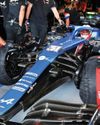It’s an irony of the industry that the ‘off-season’ is often the busiest time.

Most motorsport businesses can reflect on another good year as this season comes to a close. The majority of championships created exciting racing which should attract more partners and audiences in 2018, and most technical regulations proved to be up to the task, allowing for the usual crop of criticism.
We enter the busy winter period with various new technical challenges to be met, which bring a boost in business as these need to be developed and delivered quickly. Such is the cycle in the motorsport industry, and long may it continue.
The annual future technology conference of the MIA (EEMS) on the Wednesday before the Autosport show in January will be particularly interesting. Experts will share their vision of the two separate streams of technology which will affect motorsport over the next five years. On the one hand, hybrid solutions requiring super-efficient ICE, and on the other, the response from motorsport to the huge investments being made by the automotive sector in electric drive.
Electric drive
I expect the various hybrid solutions to remain in motorsport for longer than many believe, and create plenty of profitable challenges needing solutions. However, while activity in electric powertrains is already involving more motorsport companies, the conference will discuss how best we can rise to the challenge of making electric-powered sport entertaining, and how we can attract a new younger audience.
This story is from the December 2017 edition of Racecar Engineering.
Start your 7-day Magzter GOLD free trial to access thousands of curated premium stories, and 9,000+ magazines and newspapers.
Already a subscriber ? Sign In
This story is from the December 2017 edition of Racecar Engineering.
Start your 7-day Magzter GOLD free trial to access thousands of curated premium stories, and 9,000+ magazines and newspapers.
Already a subscriber? Sign In
Talk the torque
More thoughts on in-wheel motors and their effects on twisting force
Rolling about
An explanation of the limitations of a previous load transfer article, bringing jacking forces into the mix
F1 breaks schedule records
The FIA has confirmed no fewer than 23 races on the 2022 Formula 1 World Championship schedule, the highest number of grands prix ever to be held in a single season, and that has led to criticism from some teams that will be on the road for eight months.

Under pressure
Toyota may have finished first and second at Le Mans this year, but the effort required to overcome a fuel delivery problem and finish with both cars was Herculean
Physics at work
Dutch company, Intrax, offers Racecar Engineering an insight into the technologies it employs to optimise its suspension products
Williams' 2030 ambition
Williams Racing has committed to becoming climate positive by 2030 as part of an all-new sustainability strategy.
Diff'rent strokes
Racecar looks at the different types of mechanical differential, their benefits and limitations
Das Boot
A curious Twitter exchange fired up a unique, hydrogen-powered, cross-country project that will contest the Baja 1000 in November 2022

Air born
Every racecar engineer's dream is a blank sheet of paper design. When Hoonigan and Subaru approached Vermont Sportscars about building the next generation of Gymkhana racer, that's just what the company was given

Remote control
Called variously ‘virtual garages’, ‘mission control’ or ‘race support rooms’ is the future of race engineering sitting in the warm back at HQ?